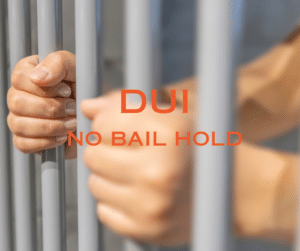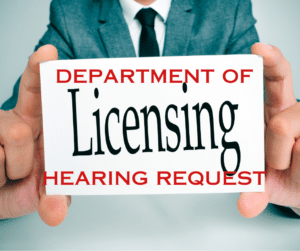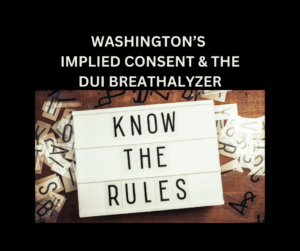The Brady List, also referred to as a Potential Impeachable Disclosure, includes a list of individuals, such as police officers, prosecutors, and others, who have been deemed to have committed some offense that makes them “suspect” in terms of their reliability for truthfulness.
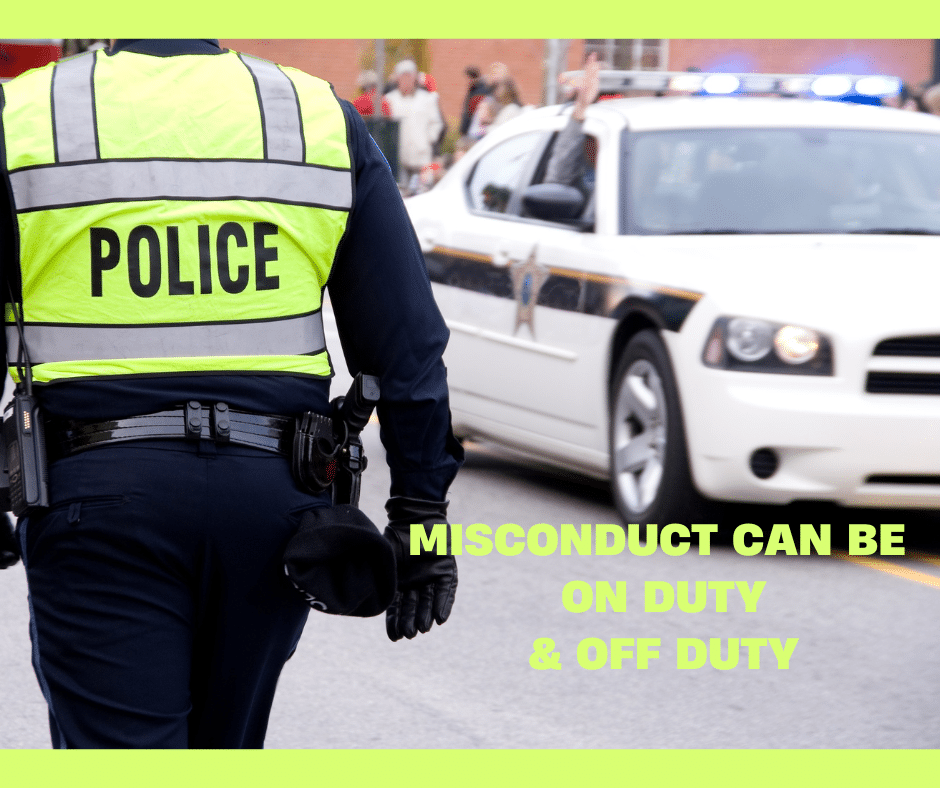
If they are still working in law enforcement and actively investigating cases, the prosecutor must notify defense if one of the investigating officers on your case is on their Brady List.
The name Brady List comes from the pivotal 1963 United States Supreme Court case, Brady v. Maryland, in which the court articulated that the government may not withhold evidence that could affect the finding of a defendant’s guilt, such as impeachable or exculpatory evidence.
If A Brady List Officer Is On My Case, Will It Get Dismissed?
Generally, no. This is because the entirety of the case or the elements of the crime would have to rest solely on the one Brady List officer to truly harm the prosecution’s case. In those cases, the prosecutor will often never charge the case to begin with. If you have been criminally charged, a prosecutor believes s/he can prove the elements through reliable and trustworthy officers and evidence.
For example, if you broke into a home and committed Residential Burglary, the Brady List officer might take pictures of missing evidence or dust for finger prints but s/he would not be the only officer investigating the case. Suppose your finger prints tie you to the scene and you believe the Brady List officer is lying or being deceitful in collecting your prints. Your defense would have to prove that only the Brady officer collected prints or the other officers are also untrustworthy and had a reason to lie and risk their job to frame you.
More likely, the prosecutor will simply not call the Brady officer in the trial and will use other officers at the scene to substantiate the professional and thorough investigation that lead to the discovery of your prints. The defense can always try to poke holes in the investigation but a judge will not allow defense to accuse all of the officers of being liars without supporting evidence of that fact.
How Does The Officer Get On The List?
The officer does not have to be charged with a crime. In fact, Sheriff Troyer (Pierce County) was found not guilty of numerous charges that were brought against him yet he was still placed on the Brady List.
In fact, the behavior may occur in the officer’s personal life (not on duty) and be deemed inappropriate for an officer. If the officer is on duty, the conduct might be something that warrants professional discipline or termination. Some departments will discipline the officer and some will terminate the officer for the exact same offense (this may depend on union rules as well).
It’s possible that the disciplined or terminated officer leaves and joins another department. Starting at a new law enforcement agency does not remove the officer from the list. In fact, the new hiring agency must determine whether there has ever been potential impeachment disclosure related to the new officer and, within 10 days of hiring, notify any prosecuting authority where the officer might testify as a witness.
See the protocol for potential impeachment disclosures at RCW 10.93.180.
Duty to Notify
The Brady List disclosure also known as Potential Impeachable Disclosure information must be provided to defense in all cases. There are several prosecutorial duties based on rules and case law that pertain to exculpatory evidence but attorneys who practice criminal law often wrap up all of those duties in the shortened phrase “Brady material.” Prosecutors are required to provide “Brady material” in all criminal cases.
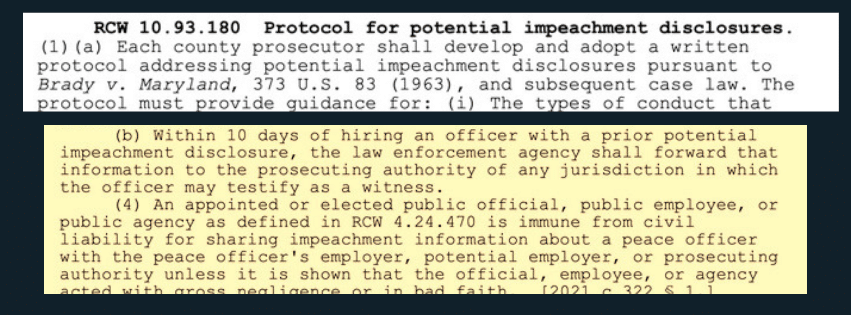
For example, Criminal Rule 4.7 requires the state (prosecutor) to provide “[] any material or information within the prosecuting attorney’s knowledge which tends to negate defendant’s guilt as to the offense charged.” Additionally, a prosecutors Rules of Professional Conduct 3.8 states that the prosecution shall “[] make timely disclosure to the defense of all evidence or information known to the prosecutor that tends to negate the guilt of the accused…” Finally, the Due Process Clause of the Constitution also obligates prosecutors to disclose any exculpatory or impeachment evidence to defense.
How Is Brady Evidence Used?
If there is evidence that is deemed exculpatory or could be used to impeach the state’s witnesses, there are multiple ways in which this evidence could be used.
If there are numerous witnesses or an abundance of other evidence that points to the defendant’s guilt, the Brady evidence won’t be particularly helpful. However, it can sometimes be enough to negotiate a better/lesser charge for a defendant who is likely to be found guilty at trial.
Additionally, if the state’s witnesses are difficult to locate, non-cooperative, or there are other evidentiary issues with the case, the defense might use the combination of weak evidence/witnesses with the Brady material to seek a dismissal or an alternative resolution.
If a negotiated resolution cannot be reached, the defendant will go to trial and hope that the Brady material is enough to create reasonable doubt as to the other evidence presented. This is the riskiest since reliable evidence of guilt is still presented and the defense cannot use impeachable evidence regarding one officer to impute a lack of veracity as to all officers or evidence.
Fake Lists
Be aware that there are organization that post “Brady List” information on the internet that are not accurate. It appears they allow the public to make complaints about officers and prosecutors but the information is not researched and vetted. In writing this blog, I came across numerous inaccuracies.
Each county in the State of Washington is required to maintain an accurate list. If you are not reviewing a county list, you cannot be sure the information is accurate.
What If The State Did Not Give My Attorney Brady Material?
Unfortunately, while prosecutors are obligated to provide Brady material to defense, a violation may not necessarily help the defendant after the fact. Additionally, even if there was a lack of disclosure, a Brady violation only occurs if three elements are satisfied.
First, the prosecution failed to disclose evidence that is favorable to the defense. Second, the prosecution suppressed the evidence willfully or inadvertently. Third, the suppressed evidence was prejudicial to the defense (i.e. it would have made a difference in the case resolution).
That last element can be a challenge. If you find out that the state withheld from defense that a certain investigating officer was on a Brady list, it may not be enough to get a new trial. On appeal, you must prove that the jury would not have convicted you if your attorney could have impeached that officer.
Suppose five non-Brady list officers testified and two eye witnesses place you at the scene, it is unlikely that impeaching the Brady list officer would have made a difference in a jury’s guilty verdict. So, while the prosecution might be admonished or disciplined, it may not amount to overturning your verdict on appeal.
This is a very abbreviated overview of Brady material and the duties of a prosecutor regarding exculpatory evidence. If you have hired an experienced criminal defense attorney for your case, the attorney will be well versed in all aspects of this issue.
Furthermore, if there is an officer on the Brady List, be aware that the information does not mean a “slam dunk” for defense. Some defendants make the mistake of thinking this evidence will create some kind of jury nullification and, unfortunately, they end up with a guilty verdict. Take the advice of a very experienced defense attorney if you are faced with this issue.
If you are facing a DUI / DWI or other misdemeanor criminal charge, reach out to our attorneys for help. We are here 7 days a week to take your call. (360) 792-1000

Get help now
Whether you choose to handle your case alone or engage the Witt Law Group, being informed and prepared is essential. Early involvement of an attorney can significantly impact your chances of a fair recovery, allowing you to focus on healing while we handle negotiations with insurance adjusters to secure fair compensation for your injuries.


